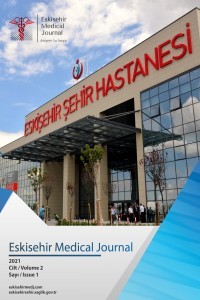Nadir Bir Olgu: Non-koroner Sinüs Valsalvadan Köken Alan Sirkumfleks Koroner Arter
Koroner arter anomalileri çok sık görülmemelerine rağmen klinik olarak önemli yansımaları olabilmektedir. Koroner arter çıkış anomalileri, tüm koroner arter anomalilerinin önemli bir kısmını oluşturmaktadır. Burada miyokart perfüzyon sintigrafisinde inferiyor alanda iskemi görülen bir hastanın sirkumfleks arterinin non-koroner sinus valsalvadan çıkışı bahsedilmiştir. 44 yaşında erkek hasta efor ile gelen baskı tarzı göğüs ağrısı ile merkezimize başvurdu. Alınan anamnez, fizik muayene ve klinik testlerin miyokart perfüzyon sintigrafisi hariç hepsi normaldi. İnferiyor duvarda iskemi görülmesi üzerine koroner anjiyografi yapıldı. İşlem sonucunda sol sinüs valsalvadan çıkan sol ana koroner arterin devamı olması gereken sirkumfleks arter, nadir olarak görülen non-koroner sinüs valsalvadan çıktığı görüldü. Sonuç olarak kritik darlık olmayan fakat koroner çıkış anomalisi olan hastalarda iskemi meydana gelebilmektedir. Biz bu vakada olan iskemiyi, normalden daha uzun bir seyir gösteren koroner arterin distal yataklarının beslenmesinin ihtiyaç anında daha geç olmasına bağladık.
Anahtar Kelimeler:
Koroner Sinus, Sinüs Valsalva, Koroner Arterler
A Rare Case: Circumflex Artery Originating From Non-coronary Sinüs Valsalva
Although coronary artery abnormalities are not very common, they can have clinically significant impacts. Coronary artery outflow anomalies constitute an important part of all coronary artery anomalies. Here, we tried to present the exit of the circumflex artery from the non-coronary sinus valsalva of a patient with ischemia in the inferior area in myocardial perfusion scintigraphy. A 44-year-old male patient was admitted to our center with chest pain. Anamnesis, physical examination and clinical tests were normal, except for myocardial perfusion scintigraphy. Coronary angiography was performed after ischemia was observed on the inferior wall. As a result of the procedure, the circumflex artery, which should be a continuation of the left main coronary artery coming out of the left sinus Valsalva, emerged from the rare non-coronary sinus Valsalva. As a result, ischemia can occur in patients without critical stenosis, but with an anomaly of coronary output. We attributed ischemia in this case to the fact that the feeding of the distal beds of the coronary artery, which has a longer course than normal, was later at the time of need.
___
- 1. Alexander RW, Griffith GC. Anomalies of the coronary arteries and their clinical significance. Circulation. 1956 Nov;14(5):800-5.
- 2. Click RL, Holmes DR Jr, Vlietstra RE, et al. Anomalous coronary arteries: location, degree of atherosclerosis and effect on survival--a report from the Coronary Artery Surgery Study. J Am Coll Cardiol. 1989 Mar 1;13(3):531-7.
- 3. Engel HJ, Torres C, Page HL Jr. Major variations in anatomical origin of the coronary arteries: angiographic observations in 4,250 patients without associated congenital heart disease. Cathet Cardiovasc Diagn. 1975;1(2):157-69.
- 4. Baltaxe HA, Wixson D. The incidence of congenital anomalies of the coronary arteries in the adult population. Radiology. 1977 Jan;122(1):47-52.
- 5. Levin DC, Fellows KE, Abrams HL. Hemodynamically significant primary anomalies of the coronary arteries. Angiographic aspects. Circulation. 1978 Jul;58(1):25-34.
- 6. Ogden J. Congenital variations of the coronary arteries: A clinicopathologic survey. Thesis, Yale University School of Medicine, New Haven, Conn., 1968.
- 7. Itho K, Shudo T, Moriguchi J, et al. [Two cases of anomalous origin of coronary artery from non-coronary sinus of valsalva identified by transesophageal echocardiography]. Kokyu To Junkan. 1993 Jul;41(7):677-81.
- 8. Taylor AJ, Rogan KM, Virmani R. Sudden cardiac death associated with isolated congenital coronary artery anomalies. J Am Coll Cardiol. 1992 Sep;20(3):640-7.
- 9. Kaku B, Shimizu M, Yoshio H, Ino H, Mizuno S, Kanaya H, Ishise S, Mabuchi H. Clinical features of prognosis of Japanese patients with anomalous origin of the coronary artery. Jpn Circ J. 1996 Oct;60(10):731-41.
- ISSN: 2718-0948
- Yayın Aralığı: Yılda 3 Sayı
- Başlangıç: 2020
- Yayıncı: Eskişehir Şehir Hastanesi
Sayıdaki Diğer Makaleler
Nadir Bir Olgu: Non-koroner Sinüs Valsalvadan Köken Alan Sirkumfleks Koroner Arter
Mehmet ÖZGEYİK, Müfide OKAY ÖZGEYİK
Ailesel Akdeniz Ateşi ve Multipl Skleroz Birlikteliği: Olgu Sunumu
Duygu ARSLAN MEHDİYEV, Egemen İDİMAN
Gut ve Paget Hastalığı Birlikteliği; Bir Tesadüf Mü?
COVID-19 ve Erkek Üreme Sağlığı
Coşkun KAYA, Mustafa SUNGUR, Aykut AYKAÇ
